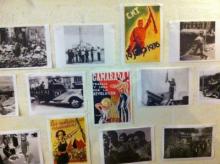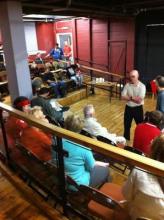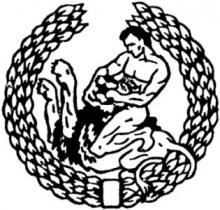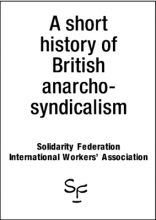Liverpool SolFed remembers the Spanish revolution
Liverpool SolFed held a social night to commemorate the anniversary of the Spanish revolution in 1936. Performers, including local musician Dominic Dunn, entertained those who were gathered, while films from the civil war and the current miners' struggle in the Asturias were shown on the projector.
1911: Liverpool in Revolt public meeting (audio+images)
Last year, around 50 people attended a public meeting hosted by Liverpool Solidarity Federation to discuss and commemorate the 1911 Liverpool general transport strike. The audio recording of the event is now finally available on Youtube accompanied by various images.
- The first speaker was local historian Frank Carlyle who regularly appears on BBC Radio Merseyside. Frank talked about Liverpool's growth as a port city and the development of its working-class. Watch the video.
-
The second speaker was a SolFed member who had done extensive research into the events of 1911, some of the key figures involved in the strike and the influence of revolutionary trade unionism. Watch the video.
Spoken history: The origins of Spanish anarchism
After sitting in the files for two years this hour-long talk in Manchester by a member of the Spanish Confederación Nacional del Trabajo has only just been formatted and uploaded to the web. In it, the formative years of what would become the largest anarchist organisation in history are described in detail, from 1840 when socialist ideas first started to penetrate into the Iberian Penninsula, up to its establishment as one of the biggest players in 20th century Spanish politics, one which would influence the world in unexpected and far-reaching ways.
SolFed on the radio
A member of Brighton SolFed was interviewed on the Novara show on Resonance FM last week. The hour long show talks about the history and theory of anarchism and anarcho-syndicalism, the differences with Marxist ideas, the occupations at Sussex University, the current anti-cuts movement and more. Listen using the player below (requires flash).
The International Workers Association
The turn of the year saw the 85th anniversary of the IWA’s founding in Berlin in December 1922 and January 1923. Here, we look at the struggle to establish an (anarcho-)syndicalist International in the 50 years between the demise of the 1st International and the events in Berlin
Many basic tenets of anarcho-syndicalism developed within the 1st International. After the split between anarchists and Marxists in 1872 the anarchist wing of the International, with a membership of 150,000, still had influence beyond its numbers. Throughout the 1870s, it assisted the development of anarcho-syndicalism.
The ‘May Days’ in Barcelona 1937
May marks the anniversary of one of the most infamous events in the history of anarcho-syndicalism and the wider working class movement
The ‘May Days’ in Barcelona 1937 was the turning point of the Spanish Civil War and Spanish Revolution, when counter-revolutionary forces moved against the anarchists, imposing greater control over the Spanish working class and reintroducing capitalist modes of production.
The Workers’ Friend - Rudolf Rocker and the Arbeter Fraint Jewish anarchist group in the East End of London
September 10th marks the 50th anniversary of the death of Rudolf Rocker, an occasion which prompted the Argentinian anarchist journal, La Protesta, to write: “With the passing of the old and dearly loved master the cycle of a brilliant generation of anarchist thinkers and militants is closed.” Here we look at some of Rocker’s contributions to the working class movement
The Early Years
A short history of British Anarcho-syndicalism
Anarcho-syndicalism is a distinct school of thought within anarchism. It seeks to abolish the wage system and private ownership of the means of production which lead to the class divisions in society. The three important principles of anarcho-syndicalism are solidarity, direct action and workers' self-management. It focuses on the labour movement more than other forms of anarchism and looks to unions as a potential force for revolutionary social change, replacing capitalism and the State with a new democratically self-managed society.




